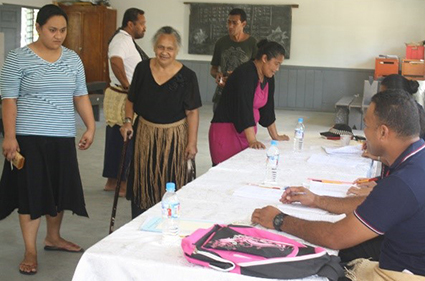
Sheryl Ho
NUKU'ALOFA (UNDP/Pacific Scoop/Pacific Media Watch): When Tonga went to the polls last month to elect new Members of Parliament, 16 women candidates representing different constituencies, took up the challenge alongside 90 men to contest the 17 seats set aside for the People’s Representatives in Parliament.
More than half of the people’s representatives were dumped in last month’s election and the major parties failed to win a majority. No women MPS were elected.
However, some of the women who ran in the elections said that they felt encouraged to run after participating in the Practice Parliament for Women held in April and a follow-up Campaign and Leadership Training.
The Practice Parliament for Women was initiated by the Tonga Parliament with the support of the Tonga Governance Strengthening Programme (TGSP).
Of the 29 women who participated, six stood as candidates in the parliamentary elections, and eight women from the 28 who participated in Campaign and Leadership Training stood as candidates.
Despite the electoral results of her constituency, Lemasigo Tania Nai, the youngest female candidate in the Tonga elections, said her campaigning experience was a positive one.
“I was happy and satisfied with the results…knowing that it was my first time, the youngest of all candidates and also I’m a woman,” said Nai.
New experience
She added that campaigning was a new experience for her, something she would not have been able to do without the knowledge and experience she gained after attending the Practice Parliament for Women, and the Campaign and Leadership Training.
For candidate Elisapesi Baker, the experience from the Practice Parliament was main reason for her decision to run.
“The Practice Parliament for Women increased awareness of how important it is for women to stand for election. My running for Parliament was a breakthrough and I know it has motivated other women to do the same.”
Baker also said she is already contemplating the next election.
“I would say that this is just the beginning,” she added.
Another candidate, Ana Bing Fonua, said the Practice Parliament experience gave her encouragement and inspiration that she will use in other endeavours.
“The intervention of the Practice Parliament for Women has made me feel an obligation to empower other women. It was the platform that I needed and it has provided me with effective tips. I felt so excited while campaigning and even afterwards knowing that I stood up and gained renewed confidence in myself.”
Speaker’s encouragement
During the Practice Parliament for Women, the participants received encouragement and advice from several Members of the Legislature, including the former Speaker of the House, Lord Fakafanua, who actively engaged in the process and advised participants during the Practice Parliament.
Lord Fakafanua said he was “very impressed with the women’s electoral performance,” adding that the active involvement and growing interest of women witnessed in the national election was “a good sign following the Practice Parliament, and it was very encouraging for women to take part and have a higher chance of succeeding. They just have to keep working on it and encourage other women to keep trying.”
Reflecting after the elections, constituency Maufanga Tongatapu 3 voter, Loata Finau said “I was hoping that one of the women would make it into Parliament to show men what we (women) are capable of.”
“This is not the end for women. Let’s pray and hope that whoever the Prime Minister is will select women for the four seats left. I’m sure those brave women candidates should be awarded by giving them those seats,” added Fisi’I’akau Vaitafa from constituency Talafo’ou, Tongatapu 10.
A candidate in the 2010 elections, Ma’a Fafine Mo e Famili director Betty Blake said she was happy to see Tongan women were advancing in their competitiveness for the election.
Comparing the 2010 elections, she said that the results proved that women were able to compete with men.
Three women who did well included Vika Vaka Fusimalohi who came second in her constituency, Tongatapu 9; Sipola Havili who was third in her constituency and Seketi Fuko fourth in her constituency.
Cultural belief
“These three women have not only proven that women can be as good as the men but also have shown that the people of Tonga, both men and women, have begun to disengage themselves from the cultural belief that the women’s place are in the home,” said Blake.
“We can see a positive sign for women to go into Parliament. It is now an opportunity for women to mobilise themselves strategically to move forward and to keep the momentum alive.”
The Tonga Governance Strengthening Programme is a four-year programme implemented by the United Nations Development Programme (UNDP) with US$3.2 million funding through the Australian Aid programme.
The programme aims to bring together and strengthen interrelated governance initiatives: the Parliament of Tonga, the Tonga Electoral Commission and civil society organisations.
Sheryl Ho writes for the United Nations Development Programme.
This work is licensed under a Creative Commons Attribution-NonCommercial 3.0 New Zealand Licence.




